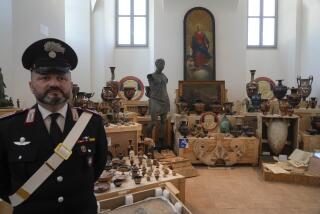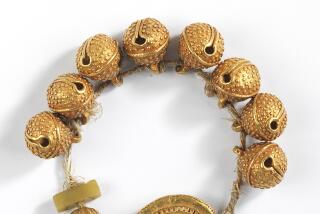U.S. Cracks Down on Journalists’ Taking Souvenirs Out of Iraq
- Share via
WASHINGTON — For two weeks, the news from Iraq has focused on the plundering of ancient art and antiquities. But now, U.S. officials are investigating whether journalists covering the war may have tried to smuggle art and other keepsakes out of the country.
Federal officials announced Wednesday that the crackdown has resulted in the seizure of 15 paintings, a cache of gold-plated weapons and other items.
Among those found carrying the booty are several members of the media, including a Fox News Channel engineer who was criminally charged Tuesday, and at least one U.S. serviceman. The government said the investigation is continuing.
“These items are not souvenirs or ‘war trophies,’ but stolen goods that belong to the people of Iraq,” said Michael J. Garcia, acting assistant secretary of the Bureau of Immigration and Customs Enforcement, an arm of the Homeland Security Department. “We will use the full authority of the law to investigate and bring to justice those engaged in this reprehensible activity.”
But Operation Iraqi Heritage, as Bush administration officials are calling the crackdown, is prompting some questions.
For years, war correspondents have brought back souvenirs from the front. And although the thousands of artifacts that have been looted from the Iraq Museum since the fall of Saddam Hussein’s regime are certainly priceless, the value of the items seized by U.S. customs officials seems far less clear. They include Iraqi government bonds and portraits of Hussein.
U.S. military officials say there is a loophole of sorts, the inevitable consequence perhaps of journalists being embedded with the military.
Bryan Whitman, deputy assistant secretary of Defense for public affairs, said journalists traveling with military units were given no specific guidelines on taking Iraqi property. “It’s a lesson learned,” Whitman said. “I guess we’ll have to put that in for future agreements: ‘When we win the war, you are not allowed to loot.’ ”
Whitman said military personnel are told before they deploy that it is a violation of the Uniform Code of Military Justice to bring back “ordnance, war trophies, artwork, artifacts or any other contraband.”
For journalists, however, taking home battlefield souvenirs “is a time-honored tradition,” Jules Crittenden, a correspondent in Iraq for the Boston Herald, told CNN in an interview broadcast Wednesday.
Crittenden, who was with the Army’s 3rd Infantry Division, arrived Saturday at Boston’s Logan International Airport from Kuwait. He declared several souvenirs and was searched, according to a statement released by his newspaper.
Crittenden, who in an article published Sunday wrote of “the gleeful looting by Baghdadis as their city descended into anarchy and the souvenir-scrounging by soldiers,” said in the CNN interview that he shared concerns about the Iraqi cultural heritage. “That is the cradle of civilization.... The items I brought back included images of Saddam Hussein that were being destroyed wholesale.”
Customs officials, who described the “intercepted” items as “a looted Iraqi painting, a wall ornament and other items,” seized them, and said they would be returned to Iraq.
Federal prosecutors in Boston said Crittenden had not broken any laws and that they didn’t intend to file criminal charges, a spokeswoman for the U.S. attorney’s office said.
On Monday, authorities said they had seized other items from several unidentified “members of the media” who arrived at Dulles International Airport near Washington. The items included a painting and a gold-plated emblem.
Also, officials said that Benjamin J. Johnson, 27, a satellite truck engineer in Iraq for Fox News, was charged in an Alexandria, Va., federal court with smuggling goods into the country and making false statements. If convicted, he would face as much as five years in prison.
According to the complaint, Johnson arrived Thursday at Dulles and presented a sworn declaration to customs inspectors stating that he had no items to declare other than $20 worth of cigarettes. Customs agents conducted a search and found 12 Iraqi paintings, 40 Iraqi bonds and a visitor’s badge from the U.S. Embassy in Kuwait.
The complaint alleges that Johnson, who like Crittenden was with the 3rd Infantry Division, initially told agents that the paintings had been given to him by people on the streets of Baghdad, but later admitted the story was false. He acknowledged taking several of the paintings from Iraqi presidential palaces and bartering with a U.S. soldier for two others. In a statement, Fox said it had fired Johnson, a six-year employee. Johnson could not be reached for comment.
Some veteran war correspondents said that while retrieving mementos is a tradition, the latest generation seemed to be taking it to a new level.
“I cannot remember anything like that,” author and journalist David Halberstam said. He recalled bringing back “a painting or two, but very simple, almost street-market things” from reporting in Southeast Asia and “one or two very primitive pieces of art” from the Congo. They were more akin to “souvenirs from the public market,” he said.
Times staff writer Esther Schrader contributed to this report.
More to Read
Sign up for Essential California
The most important California stories and recommendations in your inbox every morning.
You may occasionally receive promotional content from the Los Angeles Times.













